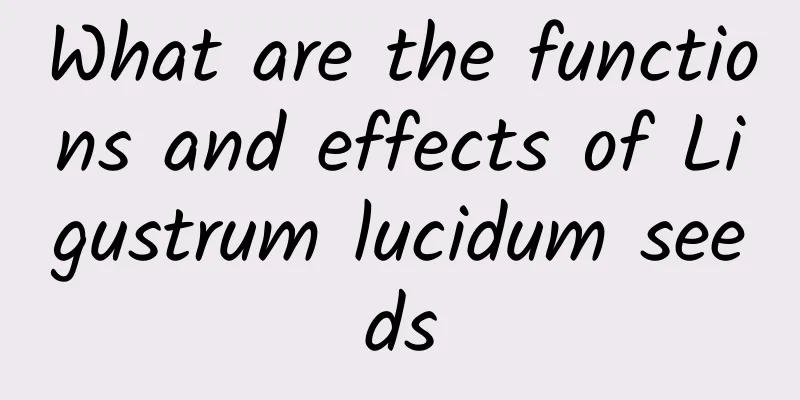What are the effects and contraindications of maple daffodils?

|
Maple mulberry is a particularly famous Chinese medicinal ingredient and a key protected plant in my country. Maple mulberry has always been called the life-saving herb. From the name you can tell how powerful the medicinal effects of maple mulberry are. In many places in our country, maple bush is regarded as a high-end health care product. Maple thrush has both edible and medicinal value, and there are many ways to cook it. Eating maple thrush regularly is very good for your health. Maple Leaf Benefits Nourishing Yin: The "Chinese Pharmacology Dictionary" states that maple tree "specializes in nourishing the qi and fluid of the lungs and stomach. When the qi and fluid are prosperous, the kidney water is naturally produced." It is said that it is good at nourishing yin and producing body fluid, and treating symptoms of yin deficiency and body fluid deficiency. According to traditional Chinese medicine, Yin fluid is the material basis of human life activities. It nourishes the body's internal organs, brain, marrow and bones, inhibits the hyperactivity of Yang, and can maintain normal growth, development and reproductive function. If the human body lacks yin fluid, symptoms such as mental depression, dull complexion, dry eyes, soreness of waist and knees, dizziness, fatigue, dry mouth, sore throat, and constipation will appear. Maple dung is an important medicine for nourishing yin. Taking maple dung can fundamentally solve the problem of insufficient yin fluid in the human body. 1. Enhance Physical Fitness: Dendrobium has the function of nourishing yin and blood. The "Materia Medica" of the Qing Dynasty said that Dendrobium can replenish the kidney and accumulate essence, nourish stomach yin, and increase qi and strength. Dendrobium is rich in polysaccharides. Experiments have shown that Dendrobium polysaccharides have the effect of enhancing immune function and can enhance the phagocytic ability of peritoneal macrophages on chicken red blood cells. Nourishes the spleen and stomach: The spleen and stomach have the important role of digesting food and taking in the essence of water and grain to nourish the whole body. They are the source of nutrition. Therefore, whether nutrition is adequate or not mainly depends on the function of the spleen and stomach. Dendrobium is a medicine that benefits the stomach and produces body fluid. It is recorded in "Shennong's Herbal Classic" and "Bencao Zaixin". People call it "gastrointestinal medicine" and it is a commonly used medicine for treating epigastric pain and upper abdominal distension. Modern experiments have confirmed that Dendrobium has a good inhibitory effect on Helicobacter pylori, a common pathogen in spleen and stomach diseases, and is helpful in treating Helicobacter pylori-positive diseases such as atrophic gastritis, superficial gastritis, and duodenal ulcers. At the same time, oral administration of Dendrobium decoction can promote the secretion of gastric juice, enhance the stomach's emptying capacity, and aid digestion. Protect liver and promote bile secretion: Dendrobium has a good choleretic effect. Doctors of all dynasties have believed that "Dendrobium candidum" has the effect of nourishing liver yin and is an important medicine for treating various liver and gallbladder diseases. It can be used to treat hepatitis, cholecystitis, gallstones and other liver and gallbladder diseases. Clearing away heat: Deficiency heat is manifested by a group of symptoms such as physical fatigue, dizziness, flushed face, palpitations, cough with little sputum, insomnia and forgetfulness, yellow and red urine, red tongue, and thin pulse. "Supplement to Compendium of Materia Medica" and "Explanation of Materia Medica" respectively record "clears the stomach and eliminates empty heat" and "eliminates empty heat in the stomach and hemorrhoids." Compared with ordinary heat-clearing drugs, the false heat cleared by Dendrobium is completely a false heat, which is characterized by yin deficiency and excessive heat. Pharmacological experiments have shown that Dendrobium can significantly reduce the peak fever and temperature response index of heat-prone rabbits and shorten the heat-prone time. Strengthens bones and muscles: After people enter middle age, "the human yin energy is halved" (Zhu Danxi). The body's yin essence begins to weaken, and the muscle and bone functions gradually decline. Dendrobium can nourish the yin fluid, and the yin fluid can lubricate the joints, thereby achieving the effect of strengthening muscles and bones, facilitating joints, and enhancing resistance to rheumatism. Modern pharmacological research shows that Dendrobium can improve stress resistance and has good anti-fatigue and hypoxia resistance effects. 1. Promotes Circulation: Dendrobium can nourish yin, moisten the meridians, dilate blood vessels, and thus promote blood circulation. Experimental results show that Dendrobium can significantly improve blood stasis symptoms, lower blood cholesterol and triglycerides, increase high-density lipoprotein cholesterol levels, and can treat cardiovascular and cerebrovascular diseases. 1. Lowers Blood Sugar: Traditional Chinese medicine believes that the occurrence of diabetes is mainly based on kidney yin deficiency and early heat of the lungs and stomach, and its pathological characteristics are deficiency of both qi and yin. Dendrobium can nourish yin, clear away heat and moisten dryness, and has been a special medicine for the treatment of diabetes since ancient times. Clinical studies have shown that Dendrobium can not only enhance insulin activity, but also significantly lower blood sugar levels and restore blood sugar to normal. Maple Taboo Patients with cold and fever should not take it, and those with severe cold and dampness should take it with caution. Patients with chronic diseases such as hypertension, heart disease, liver disease, diabetes, kidney disease, etc. should take the medicine under the guidance of a physician. |
<<: What are the effects of drinking Chuanxiong soaked in water?
>>: What are the effects of hemp seeds
Recommend
The efficacy and function of Paulownia leaves
The medical value of Paulownia leaves is beyond o...
Big data reveals the top ten cities with the thickest snow in my country
China Weather Network News: There is no winter wi...
The efficacy and function of ground peach
Traditional Chinese medicine is very helpful in t...
The efficacy and function of red elm
Chinese medicine has different effects on our bod...
The efficacy and taboos of boiling mulberry leaves in water
Mulberry leaves are a natural plant that can not ...
The efficacy and function of the magpie tree
Traditional Chinese medicine culture is profound ...
The efficacy and function of the root of big tea
Everyone is familiar with the medicinal root of b...
The ocean is an excellent "carbon capturer"! Come and learn about marine carbon sinks and help achieve the "dual carbon" goals!
All known life on Earth is based on carbon as org...
Prozac is still unsolved: Where is the future of new antidepressant drugs?
In 1954, the first compound with antidepressant e...
The efficacy and function of water dragon
Do you know water dragon? It is a common Chinese ...
Hormones cause obesity?! You are wrongly blaming it!
When a doctor tells you that you need to take a c...
The efficacy and function of Zhi Zi Yuan
In life, roasted aster is a relatively precious C...
ChatGPT is almost one year old! How did it develop such fluent conversation skills?
ChatGPT will be one year old in November this yea...
When the sun turns on "violent mode", the earth simply can't "bear it"...
Before going out Checking the weather forecast is...









